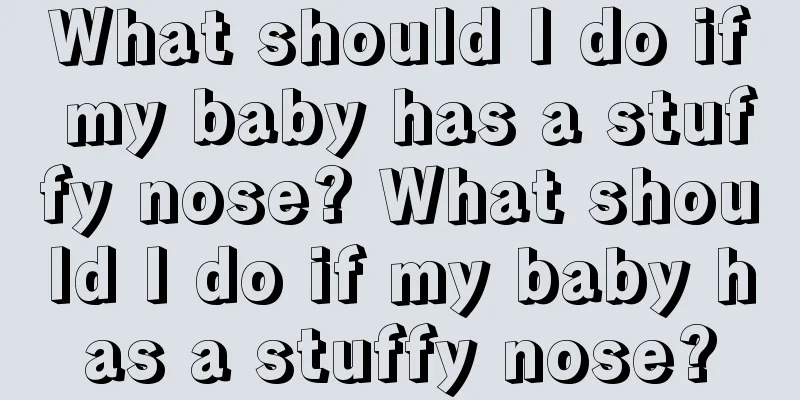What should I do if my baby has a stuffy nose? What should I do if my baby has a stuffy nose?

|
Newborns have a high metabolism when they are just born, so they secrete a lot of nasal mucus. When taking care of their babies, many parents worry that their babies' noses are blocked by nasal mucus, which may affect their breathing. In fact, if the nasal mucus is too large, it will affect breathing. Today, let's see how to deal with the nasal mucus problem correctly. What to do if your baby has a stuffy noseWhen the baby's nose is blocked by nasal mucus, parents can first soften the mucus and try to drop some fish glycerin or a drop of warm water into the baby's nasal cavity. After the blockage is softened, hold the child upright to see if it can flow out by itself, or use a nasal aspirator to gently suck it out. For serious nasal congestion, if the mucus cannot be sucked out after softening, you can only use external force to clean it. If the cotton swab is too large or inconvenient to clean, you can use tweezers for children. But remember, you must be patient when cleaning, and master the degree and strength. Don't be impatient and use too much force, otherwise it will cause damage to the child's nose. When there is mucus in the baby's nose that affects ventilation, you can cover the baby's mouth and nose with a hot towel to reduce mucosal congestion, soften the mucus, and the hot steam will also promote nasal passage patency. The specific method is: soak a towel in hot water, wring it out and apply it to the baby's nose. You can cover the hot towel with another towel to keep the heat. Change the towel every 5 minutes, and it is best to use 2 towels alternately. The hot compress time is 15 to 20 minutes, 3 to 4 times a day. How to prevent a clogged nose1. Use a simple non-irritating oil (such as Vaseline, lanolin, paraffin oil) to apply it to the nasal vestibule with a cotton swab three or four times a day, especially in the morning, evening and before going to bed. This can make the front of the nasal cavity oily and not dry, and there will be no nasal mucus. This method can not only protect the nasal cavity, but also prevent nasal secretions from sticking to the nasal vestibule to cause nasal mucus. It can even reduce the habit of children picking their noses due to nasal itching, and can also reduce the situation of nosebleeds caused by picking the nasal vestibule. 2. Put warm water in a spill-proof baby bottle. After the baby falls asleep at night, turn the bottle upside down and when the water stops dripping, gently pinch the nipple a few times with your hand and drip water into the lower edge of the baby's nostrils. This will also moisten the baby's nasal cavity. 3. Place a humidifier in the room to ensure the indoor humidity, especially in winter when the air is most prone to dryness. Alternatively, place a basin of clean water in the room at night. If the floor is dry, it is best to wipe it with a wet cloth twice a day to moisturize the room. Wash your baby's face every night before going to bed, which can also moisturize the nostrils. Is it useful to use a nasal aspirator?Actually, I bought a nasal aspirator a long time ago, but it didn’t work very well, so I put it in a corner. The nurse also told me that babies are so delicate that using this thing to aspirate can easily damage their delicate organs. Earlier, I also used the folk method recommended by my mother: fumigating with vinegar. I heard that my sister and I also used this method to clean our noses when we were young, haha! However, this method did not work on my little match. Put heated vinegar in a bottle and let his little nose smell it. I thought the nose would come out after smelling it, but after a long time, the nose did not move at all. This method takes a very long time and it is said that vinegar is not good for babies, so it is not recommended. Later, one time, after I tried all the methods, the baby started to cry loudly, with tears, snot, and mucus all flowing out! It turns out that when the baby cries, the mucus will probably flow out slowly with the snot! I was overjoyed! Haha, so every time I saw his nose full of mucus, I would shout to him, baby, cry! Cry! What a perverted mother's behavior! |
<<: Things to note during early pregnancy:
Recommend
Can pregnant women eat longan? Is it good for pregnant women to eat longan?
Longan is a very common fruit. It has good nutrit...
Can I eat hot pot after I finish my confinement? What should I pay attention to when eating hot pot after I finish my confinement?
What does "coming out of confinement" m...
How many sizes are there for Pampers diapers? What size baby is suitable for Pampers diapers size S?
The sizes of diapers used by babies at different ...
What to do if your baby's mouth smells like rotten eggs? Bad breath problems cannot be ignored
Some babies have the smell of rotten eggs in thei...
How to check for diarrhea in children? Five steps to pay attention to
Diarrhea in children is a common phenomenon, and ...
The reason why babies don't cry when they are held in an airplane position. How many months can they be held in an airplane position?
Babies sometimes cry for no apparent reason, and ...
Can I use vegetable oil to rub the umbilical cord of a newborn baby if it is inflamed? Can I use vegetable oil to rub the umbilical cord?
Can I use vegetable oil to wipe the umbilical cor...
How to calculate the ovulation period of women most accurately
A healthy baby is formed by the combination of sp...
What are the main symptoms of abnormal baby fontanelle? What should I do if my baby's fontanelle is small?
The fontanelle can reflect the baby's physica...
Can I eat mutton when I am one month pregnant? Can I eat beef when I am one month pregnant?
There are many food taboos during pregnancy. So, ...
Hypnobirthing makes childbirth easier
Hypnobirthing is a method of childbirth that reli...
Should you exercise more during pregnancy? Precautions during pregnancy
Pregnancy is a very hard thing, and you need to b...
What games are good for one-year-old babies? What games are suitable for one-year-old babies?
When a baby is one year old, both the fine moveme...
Children's interpersonal relationships start with learning to respect each other
Maintaining good interpersonal relationships is a...
What kind of water is good for babies? What kind of water is good for babies?
What kind of water is good for babies to drink? W...









